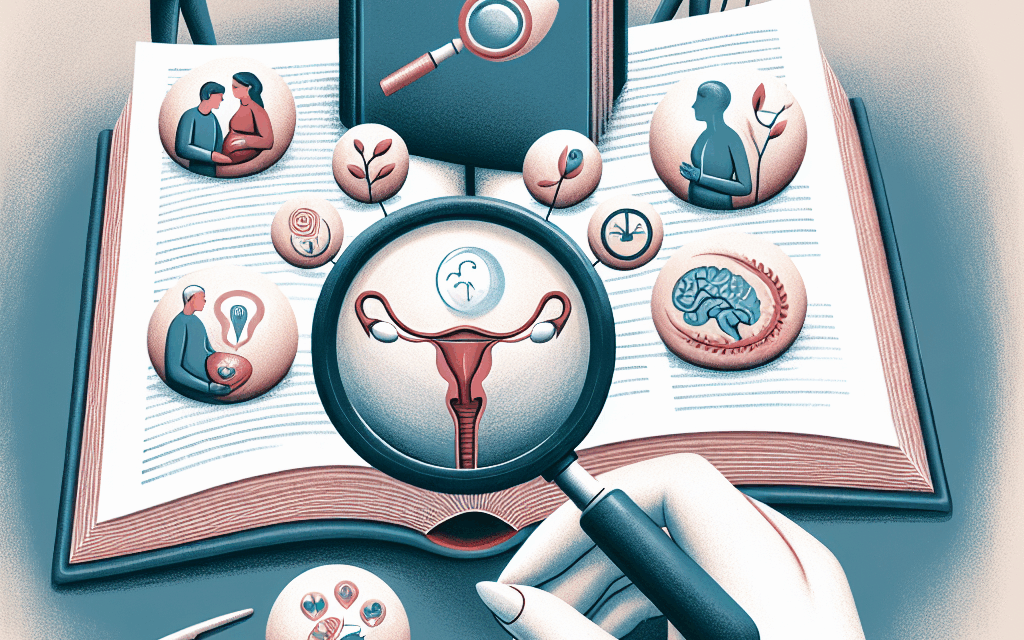Understanding Secondary Infertility: Advances in Medicine, Causes, and Support Solutions
Infertility is often perceived as a challenge faced by couples trying to conceive for the first time. However, secondary infertility, defined as the inability to conceive after having one or more children, is a growing concern that affects many families. This article delves into the complexities of secondary infertility, exploring its causes, the latest medical advancements, and the support solutions available for those affected.
What is Secondary Infertility?
Secondary infertility is a condition that affects couples who have previously conceived but are now struggling to achieve another pregnancy. It can be a source of emotional distress and confusion, as many couples may not expect to face difficulties after having had a child. Understanding the nuances of secondary infertility is crucial for those experiencing it, as it can differ significantly from primary infertility.
According to the Centers for Disease Control and Prevention (CDC), approximately 12% of women aged 15-44 in the United States face difficulties in getting pregnant or carrying a pregnancy to term. Among these, a significant portion experiences secondary infertility. The emotional toll can be profound, leading to feelings of inadequacy, anxiety, and depression.
Causes of Secondary Infertility
Identifying the causes of secondary infertility is essential for effective treatment. Various factors can contribute to this condition, and they can be broadly categorized into female factors, male factors, and lifestyle influences.
Female Factors
Female reproductive health plays a crucial role in secondary infertility. Some common female-related causes include:
- Age: As women age, their fertility naturally declines. Women over 35 may experience a more significant decrease in fertility, making conception more challenging.
- Hormonal Imbalances: Conditions such as polycystic ovary syndrome (PCOS) or thyroid disorders can disrupt ovulation and lead to infertility.
- Uterine Abnormalities: Fibroids, polyps, or structural issues within the uterus can hinder implantation or lead to miscarriage.
- Endometriosis: This condition, where tissue similar to the lining of the uterus grows outside it, can cause pain and fertility issues.
Male Factors
Male infertility can also contribute to secondary infertility. Key male-related causes include:
- Sperm Quality: Issues such as low sperm count, poor motility, or abnormal morphology can affect the ability to conceive.
- Hormonal Issues: Low testosterone levels or other hormonal imbalances can impact sperm production.
- Medical Conditions: Conditions like diabetes, cystic fibrosis, or infections can affect male fertility.
Lifestyle Influences
Lifestyle choices can significantly impact fertility for both partners. Factors to consider include:
- Weight: Both obesity and being underweight can affect hormonal balance and ovulation.
- Substance Use: Smoking, excessive alcohol consumption, and drug use can impair fertility in both men and women.
- Stress: High levels of stress can disrupt hormonal balance and affect the ability to conceive.
Advances in Medical Treatments for Secondary Infertility
With advancements in reproductive medicine, couples facing secondary infertility have more options than ever before. Understanding these treatments can empower couples to make informed decisions about their fertility journey.
Fertility Testing
The first step in addressing secondary infertility often involves comprehensive fertility testing. This may include:
- Blood Tests: Hormonal assessments can help identify issues with ovulation or other hormonal imbalances.
- Imaging Tests: Ultrasounds or hysterosalpingography (HSG) can evaluate the health of the uterus and fallopian tubes.
- Semen Analysis: For male partners, a semen analysis can assess sperm count, motility, and morphology.
Medications
Depending on the underlying cause of infertility, various medications may be prescribed:
- Ovulation Induction: Medications like Clomiphene citrate or letrozole can stimulate ovulation in women with irregular cycles.
- Hormonal Treatments: Hormonal therapies may be used to address imbalances affecting fertility.
Assisted Reproductive Technologies (ART)
For couples who do not conceive with medications alone, assisted reproductive technologies may be recommended:
- Intrauterine Insemination (IUI): This procedure involves placing sperm directly into the uterus during ovulation to increase the chances of conception.
- In Vitro Fertilization (IVF): IVF involves retrieving eggs and fertilizing them with sperm in a lab before transferring the embryo back into the uterus.
- Intracytoplasmic Sperm Injection (ICSI): This technique involves injecting a single sperm directly into an egg, often used in cases of male infertility.
Surrogacy and Egg Donation
For couples facing severe fertility challenges, surrogacy or egg donation may be viable options:
- Surrogacy: In cases where a woman cannot carry a pregnancy, a surrogate may carry the child for the couple.
- Egg Donation: Women with diminished ovarian reserve may consider using donor eggs to achieve pregnancy.
Emerging Technologies
Research in reproductive medicine continues to evolve, with promising new technologies on the horizon:
- Genetic Screening: Preimplantation genetic testing (PGT) allows for the screening of embryos for genetic disorders before implantation.
- Stem Cell Research: Investigations into stem cell therapy may offer new avenues for treating infertility in the future.
Emotional and Psychological Impact of Secondary Infertility
The emotional toll of secondary infertility can be profound, affecting not only the couple but also their existing children and family dynamics. Understanding and addressing these emotional challenges is crucial for overall well-being.
Feelings of Guilt and Inadequacy
Many couples experiencing secondary infertility may grapple with feelings of guilt or inadequacy. They may question why they are unable to conceive again when they have successfully done so in the past. This can lead to:
- Self-Blame: Couples may blame themselves for their inability to conceive, leading to decreased self-esteem.
- Relationship Strain: The stress of infertility can create tension between partners, leading to misunderstandings and conflict.
Impact on Existing Children
For couples with existing children, secondary infertility can also affect family dynamics. Parents may worry about how their struggles will impact their children:
- Emotional Burden: Children may sense their parents’ distress, leading to feelings of confusion or anxiety.
- Sibling Relationships: The desire for a sibling can create tension if the existing child feels responsible for their parents’ emotional state.
Seeking Support
Finding support is essential for couples navigating secondary infertility. Options include:
- Support Groups: Joining a support group can provide a safe space to share experiences and connect with others facing similar challenges.
- Counseling: Professional counseling can help couples process their emotions and develop coping strategies.
Communication with Partners
Open communication between partners is vital in addressing the emotional aspects of secondary infertility. Couples should consider:
- Expressing Feelings: Sharing feelings of frustration, sadness, or fear can foster understanding and support.
- Setting Boundaries: Discussing how to handle social situations, such as baby showers or family gatherings, can help manage emotional triggers.
Mindfulness and Stress Reduction
Practicing mindfulness and stress reduction techniques can also be beneficial for couples facing secondary infertility. Techniques may include:
- Meditation: Mindfulness meditation can help reduce anxiety and promote emotional well-being.
- Yoga: Yoga can provide physical and mental benefits, helping to alleviate stress and improve overall health.
Support Solutions for Couples Facing Secondary Infertility
Support solutions for couples dealing with secondary infertility encompass a range of resources, from medical assistance to emotional support. Understanding these options can empower couples on their journey.
Medical Support
Access to medical support is crucial for couples facing secondary infertility. This includes:
- Fertility Specialists: Consulting with a reproductive endocrinologist can provide couples with tailored treatment plans based on their specific needs.
- Comprehensive Care: A multidisciplinary approach involving gynecologists, urologists, and mental health professionals can address all aspects of infertility.
Financial Assistance
The financial burden of infertility treatments can be significant. Couples should explore options such as:
- Insurance Coverage: Understanding insurance policies regarding fertility treatments can help alleviate financial stress.
- Grants and Scholarships: Various organizations offer financial assistance for couples seeking fertility treatments.
Community Resources
Community resources can provide additional support for couples facing secondary infertility. These may include:
- Local Support Groups: Many communities offer support groups specifically for individuals dealing with infertility.
- Online Forums: Online communities can provide a platform for sharing experiences and advice with others facing similar challenges.
Educational Resources
Staying informed about infertility can empower couples to make informed decisions. Educational resources may include:
- Workshops and Seminars: Many fertility clinics offer educational workshops on various aspects of infertility.
- Books and Articles: Reading about infertility can provide valuable insights and coping strategies.
Holistic Approaches
Some couples may find holistic approaches beneficial in their journey. These may include:
- Nutritional Counseling: A balanced diet can support overall health and fertility.
- Acupuncture: Some studies suggest that acupuncture may improve fertility outcomes by reducing stress and promoting hormonal balance.
Conclusion
Secondary infertility is a complex and often emotionally challenging experience for couples who have previously conceived. Understanding the causes, exploring medical advancements, and seeking emotional support are crucial steps in navigating this journey. With the right resources and support systems in place, couples can find hope and resilience as they work towards expanding their families.
As research continues to advance in the field of reproductive medicine, there is hope for those facing secondary infertility. By staying informed and seeking support, couples can empower themselves to make informed decisions and find the path that is right for them. Remember, you are not alone in this journey, and there are resources available to help you through the challenges of secondary infertility.





